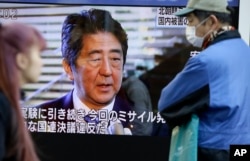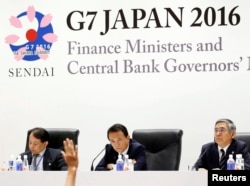The host of this year’s G-7 Summit, Japan – the world’s third-largest economy – is facing contraction while nothing the government has been trying has been able to bring about a turnaround.
That has taken the country, with an aging population and no economic growth amid decades of deflation, from an object of envy to a country practically deserving of pity among its peers in the Group of Seven industrialized nations.
“How all this pans out, I think we’re in uncharted territory,” entrepreneur William Saito, a special adviser to the Cabinet Office, told VOA.
The homogeneous island society is averse to mass immigration – a solution other countries have used to compensate for a declining population.
Structural changes
“This market is shrinking overall. It makes it very difficult to get it moving again. This requires some major structural changes and these take time,” said Martin Schulz, senior economist at the Fujitsu Research Institute.
The opening of the economy, changing the structure of the agricultural sector and helping Japanese companies invest in Southeast Asia, will pay off, but over a 10- to 15-year period, Schulz asserted.
“We are probably the first large nation to grapple with these challenges. That means that, we are likely to be, at the same time, the people who come up with viable solutions,” said Shin Fukushige, Asia managing director for the American 3-D imaging technology company Seikowave.
Prime Minister Shinzo Abe’s attempted solutions – fiscal stimulus, monetary easing and structural reform – Abenomics’ three arrows – have fallen short of the mark.
“The area he failed in most miserably is structural reform. I think for the last few years he has been just unable to tackle any reforms which are worthy of the name structural,” said Takuji Okubo, managing director at Japan Macro Advisors. “And I don’t think he understands the depth of the problem in the labor market or with pension reforms.”
Savings vs. spending
Japan’s public pension plans are heavily underfunded, giving middle-class families, whose assets would be the envy of many in other developed countries, great pause about any frivolous spending.
Young people, struggling in their first jobs, as well as retirees with relatively ample savings, also remain reluctant to open their wallets.
The average savings for Japanese households last year hit a record 18.05 million yen (about $164,000 at the current exchange rate), according to the internal affairs ministry.
The issue of tightfisted consumers in Japan and elsewhere was discussed by G-7 finance ministers when they met Friday and Saturday in Sendai.
"There is no demand and that is one of the biggest problems around the world," Japanese Finance Minister Taro Aso told reporters on Saturday.
“Abenomics has failed to get citizens to spend because people are uncertain about the future. So the government needs to try something else,” said Manabu Goto, who runs a small family store in a residential district of Tokyo selling Japanese processed fish products known as “kamoboko.”
Innovation
The half-century old store, in the Togoshi Ginza shopping district in Shingawa ward, has innovated in a successful bid to attract more customers and get them to spend more.
Goto has created original products, keeps his establishment open on weekends and added a small eat-in area for what traditionally has been a take-away only establishment.
More Japanese businesses, small and large, need to have the confidence to shake things up, according to entrepreneurs and economists.
“It’s just confidence. If you look at the last 20 years, the economic fundamentals, the infrastructure, government politics, these things haven’t actually changed. At the end of the day we’re in where we are because it’s just this lack of confidence,” government adviser Saito said.
There is some evidence business operators in Japan like Goto are no longer an anomaly.
“There has been a huge improvement in psychology” in the past decade, said Fukushige, a tech entrepreneur and former venture capitalist.
A continuing frustration, however, for Japanese entrepreneurs – the drivers for innovation – is convincing talented people to eschew Japan Inc. and take a risk.
“You want the best and brightest working at your company and it’s quite hard to be competing with these large, established which can offer employees at least the illusion of security,” Fukushige told VOA.
Corporate giants
Japan’s corporate giants remain those that were established many decades, if not centuries, ago, while America’s economy has been bolstered in recent years, in significant part, thanks to upstarts such as Apple and Google.
The question remains how to best get Japan’s aging and slow-moving economy growing and innovating?
Some believe the seeds have already been planted even if there has not yet been noticeable growth.
“You need to be quite radical for the big bazooka to have any impact. And this has already happened in Japan,” economist Schulz told VOA. “Monetary policy is the most extreme anywhere. Textbooks are rewritten here on what the Bank of Japan is already doing.”
With Japan currently at the helm of the G-7, its message to its peers this month is “we’re in the same boat. We’re a very connected global economy and it probably doesn’t benefit anybody to get into a tit for tat,” Saito said. “Let’s be rational about this and not do anything crazy for the benefit of just one country, for the detriment of the global economy.”
After the G-7 Summit, to be held May 26-27, on the Shima peninsula 300 kilometers southwest of Tokyo, all eyes will turn back to the Bank of Japan in the capital.
The bank’s governors are urging patience for a few more months until already enacted stimulus measures show results. If the economy does not improve, even more radical moves – as some advocate – could be taken by the central bankers.
Suggestions from economists include imposing negative interest rates on or taxing ordinary savings deposits and forcing companies to significantly hike wages.
One thing Japan’s G-7 partners do not want it pursuing is intervention in the currency market to push down the yen – which would make the country’s exports cheaper abroad.
A closing statement on Saturday at the finance ministers’ meeting "underscored the importance of all countries refraining from competitive devaluation.”





